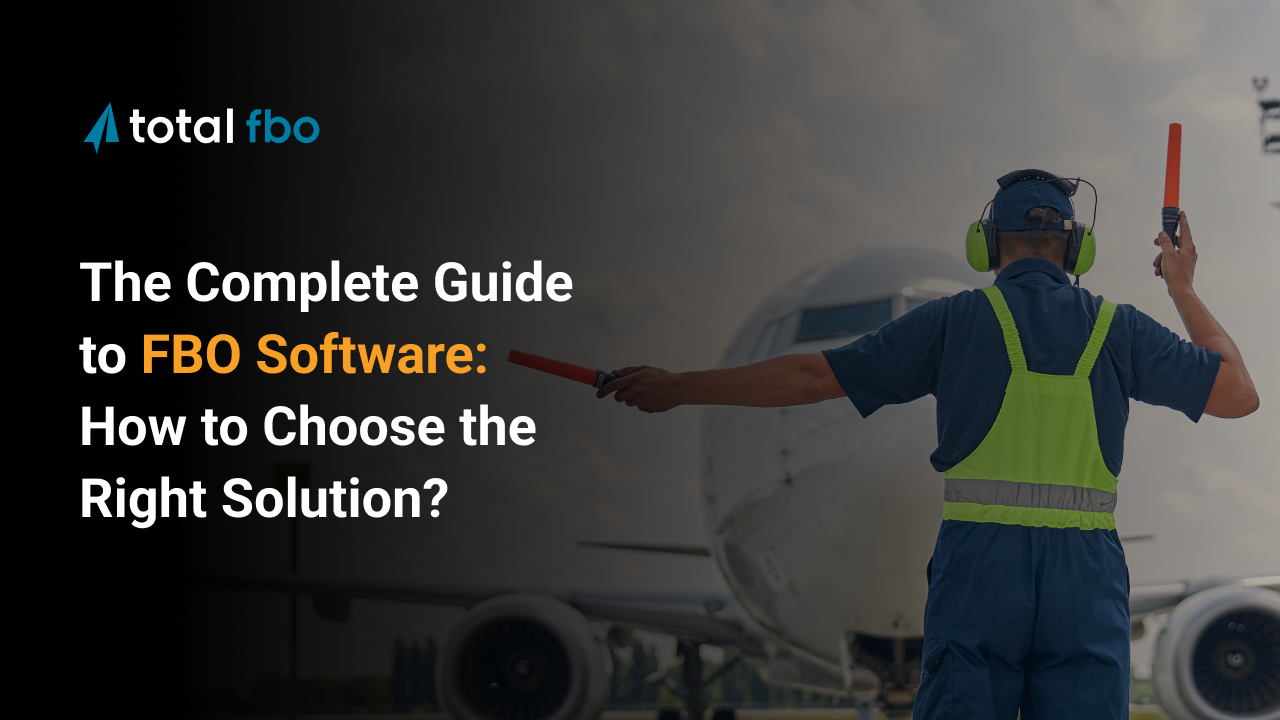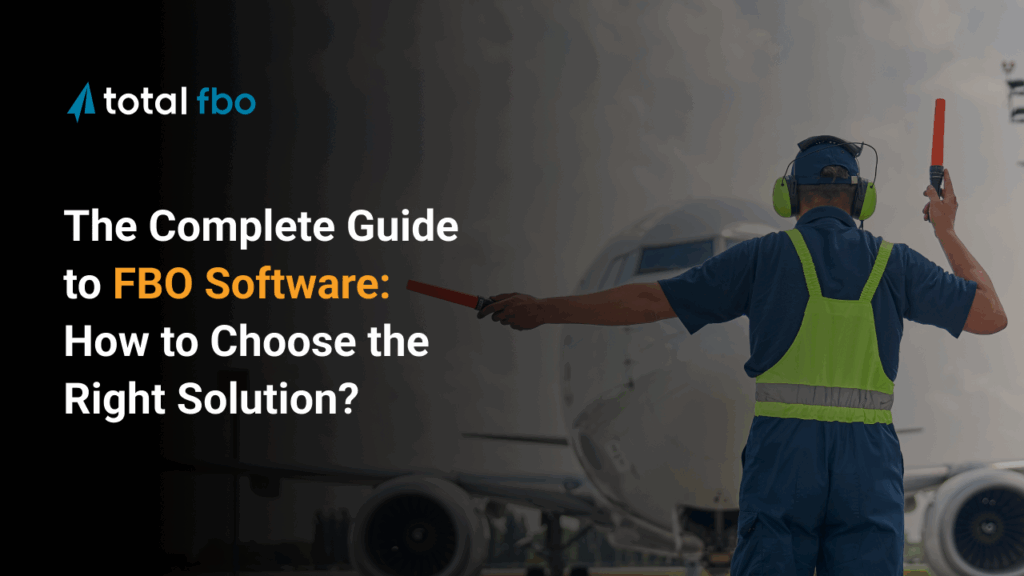The Complete Guide to FBO Software: How to Choose the Right Solution?

Fixed-Base Operators (FBOs) are critical to airport operations, serving as the backbone for business and private aviation. From fueling and ground handling to hangar space, MRO, and concierge services, FBOs offer a comprehensive range of essential services for aircraft, passengers, and crew.
The operational demands of running an FBO are complex—and continuing to grow. With rising air traffic, increasing customer expectations, and regulatory pressures, manual processes are no longer sustainable. This is where FBO software becomes not just helpful, but vital.
Common Challenges in FBO Operations
FBOs frequently encounter numerous complexities that impede operational efficiency and profitability.
- Manual Processes and Data Silos: Relying on paper-based and disconnected systems results in inefficiencies, errors, and fragmented insights.
- Inaccurate Transaction Tracking and Revenue Leakage: Without integrated systems, tracking departmental contributions and inter-departmental transactions is difficult, leading to missed revenue and unclear finances.
- Compliance and Audit Burdens: Meeting aviation regulations such as GAAP, PCI, FAA, and preparing for audits is often time-consuming and often has documentation gaps.
- Inefficient Resource Management: Managing multi-site staff, shift handovers, and tracking employee training and certifications are time-consuming.
- Sub-optimal Customer Service: Without a real-time, centralized view of operations, Customer Service Representatives (CSRs) struggle to quickly access vital information such as ramp traffic, invoicing, or reservations by tail number, impacting service quality.
- Fuel Management Inaccuracies: Manual fuel logging is prone to errors. Digital integration with fuel trucks ensures meter-accurate capture, real-time synchronization, and precise billing without manual entry.
With rising air traffic and complex operations, manual FBO service management is no longer a viable approach. This is where FBO software emerges as an essential technological solution. It streamlines operations, improves service, and increases profitability by integrating all departmental functions into one cohesive system, eliminating fragmented data.
What is FBO Software?
FBO software is a purpose-built system designed to automate, track, and optimize the operations of Fixed-Base Operators. It centralizes critical data, streamlines workflows, and provides comprehensive visibility across the entire business, eliminating data silos, ensuring operational consistency, and facilitating efficient transaction tracking, GAAP-compliant bookkeeping, and multi-site management from a single database.
Core Features of FBO Software
Fuel Management
This feature enables real-time inventory tracking, dynamic pricing adjustments, and automated fuel delivery processes. Solutions such as Total FBO offer fuel truck automation, digitally capturing data directly from fuel meters to eliminate errors and seamlessly sync with the main system. This automation ensures accuracy from pump to invoice, improving financial control.
Hangar & Ramp Scheduling
Scheduling feature provides a single, intuitive display for CSRs to visualize ramp traffic, manage invoicing, reservations, and dispatching, and efficiently look up visitors by tail number. This enables precise management of aircraft movements, optimizing the utilization of valuable hangar and tie-down space. Allowing scheduling for optimal pull–out times to prevent customer delays.
Billing & Invoicing
Automated and intelligent billing is a core feature that addresses the complexities of FBO financial operations. Total FBO, for instance, provides automatic invoicing and GAAP-compliant double-entry bookkeeping that facilitates auto-reversals for accruals, ensuring financial accuracy and compliance.
Customer Relationship Management (CRM)
A robust CRM centralizes customer data, providing insights into preferences, service history, and loyalty. This facilitates personalized service delivery, offering a seamless and tailored experience. Can also be shared within multi location facilities to guarantee consistent Brand Image and Loyalty.
Staff Management
This feature helps manage teams across multiple sites, facilitating seamless handovers and reducing the need for physical visits to satellite locations. It also ensures compliance through staff training functionality, optimizing workforce efficiency and compliance.
Third-Party Integrations
Seamless integration with other industry tools and systems is vital for connected FBO operations. Integrations with flight planning systems, accounting/finance systems ensure synchronized financial charges and sales invoices. Direct integrations with fuel vendors streamline fuel release and payment.
Key Benefits of FBO Software
Operational Efficiency
FBO software centralizes billing, scheduling, and check-ins, reducing manual errors and increasing throughput without increasing headcount.
Enhanced Customer Service
By centralizing customer data and preferences, FBO software enables staff to deliver highly personalized services. CSRs get real-time views of ramp traffic, invoicing, and customer history, allowing for swift responses and seamless concierge service. This personalized and efficient experience builds customer loyalty and repeat business. Your FBO Software should allow you to focus on delivering enhanced customer service not focusing on data entry.
Revenue Optimization
FBO software maximizes profit margins through accurate, automated billing, clear cost visibility, and streamlined fuel purchasing. Customizable loyalty discounts and in-depth reporting provide insights for data-driven pricing and service offerings. Easy to use Business Analytics are integral for increasing margins, and making data driven decisions quickly.
Stronger Compliance & Safety
FBO software is designed with compliance as a fundamental principle, ensuring GAAP-compliant bookkeeping and integrating PCI and PA-DSS certified payment processing. Proactive safety management mitigates risks, enhances reputation, and attracts safety-conscious clients.
Scalability & Multi-Site Management
Modern FBO software is designed for scalability, with flexible architectures that grow with the business. It offers enterprise functionality to manage multiple FBO locations from a single database, a crucial capability for businesses expanding their networks or combining entities. New development in additional modules indicates recognition where the FBO software can additionally support its partners.
Choosing the Right FBO Software
Selecting the right FBO software is a strategic decision crucial for long-term success. A systematic approach ensures the chosen solution perfectly aligns with business requirements and future growth.
Define Your Needs
The initial and most critical step in selecting FBO software is a detailed needs assessment. This involves clearly identifying your pain points and current operational workflows. Clearly articulate what the new software must achieve, focusing on solutions that directly address core challenges. Avoid bloated systems with features you won’t use instead look for modularized software platform that can grow with your business.
Prioritize Scalability
Your chosen software must be capable of growing with your business. It should seamlessly handle increased workloads, more users, and complex processes without performance issues. Crucially, it should be easily upgradable and customizable for future demands, a critical requirement for managing multiple FBO locations.
Ensure Easy Integration
Compatibility with existing systems is paramount for a smooth transition and continuous operations. The new FBO software must seamlessly integrate with current hardware, operating systems, accounting applications and flight planning tools to avoid inefficiency and avoid seamless interaction. Robust APIs or pre-built connectors indicate good integration, preventing disruptions and data silos.
Verify Training & Support
Comprehensive user training and ongoing support are vital for the successful adoption and long-term return on investment (ROI) of any FBO software. Vendors should offer a comprehensive curriculum, flexible training sessions (e.g., via webinars), readily available user videos and how-to guides, and highly responsive support, including extensive emergency assistance for bug fixes and updates. Allowing customers to interact with a “sandbox” environment allows real time scenarios to be sure your software is a good solution.
Evaluate Vendor Reputation & Security
It’s essential to meticulously investigate the vendor’s track record, customer reviews, and overall industry reputation. Software change is a long-term decision so a provider with market share and longevity is less risky than newer platforms without the aviation ecosystem. Prioritize vendors committed to strong security measures, including hosting on secure cloud servers (such as AWS), dedicated security teams, and regular audits. Robust cybersecurity is essential for safeguarding sensitive aviation data and financial transactions.
FBO software is no longer a nice-to-have – it’s a strategic necessity that revolutionizes aviation ground operations. It transforms FBOs from manual, fragmented systems into efficient, data-driven ecosystems, enhancing operational efficiency, customer service, revenue, and compliance.
As the global FBO market is projected to reach $41.49 billion by 2031, technology adoption is accelerating. Total FBO is at the forefront of this transformation, offering a complete suite for managing all FBO operations and finances, robust multi-site enterprise functionality, and stringent security—all designed to drive unparalleled FBO success through integrated technology. Total FBO is creating an Aviation Ecosystem with its other CAMP owned businesses which includes CORRIDOR, Quantum, ILS, FlightBridge, Avinode, AMSTAT, FBO One with the intended result to proactively drive revenue to their FBO partners. Don’t catch yourself reacting to your business needs allow your software to capture data points to evaluate and quickly make decisions based on easy to review financial information.





